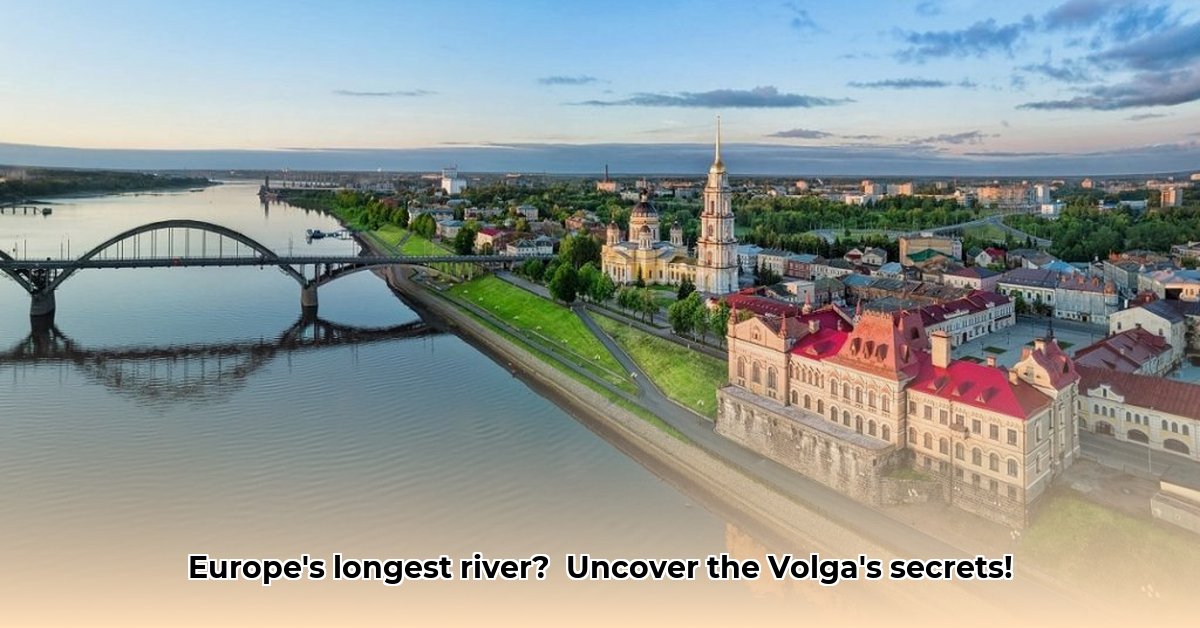
Europe's Longest River: Uncovering the Volga's Mighty Influence
The Volga River, snaking its way across Russia for over 3,500 kilometres, isn't just Europe's longest river; it's a vital artery, shaping Russia's history, economy, and environment. But its future, like that of other major European rivers, is intertwined with the ever-growing challenges of climate change. This article explores the Volga's impact, compares it to other significant European rivers, and examines strategies for ensuring the sustainable management of these crucial waterways.
A Journey Through History and Landscape
Imagine the Volga's epic journey: from its humble beginnings in the Valdai Hills to its powerful delta spilling into the Caspian Sea. This colossal river traverses diverse landscapes – forests, plains, and steppes – profoundly impacting countless communities along its banks. For centuries, the Volga has served as a crucial trade route, its waters carrying goods and connecting distant settlements. But this wasn't always easy; harsh winters frequently froze the river, disrupting navigation and trade. This highlights the vital need for infrastructure upgrades and adaptation to the river's rhythms. But is modern ice-breaking technology enough against the potential impact of a changing climate? What happens if winters get even harsher? These questions loom large.
Isn't it fascinating how a river's flow can change so drastically? The Volga's journey mirrors the life of many who live alongside its banks, intertwined with its rhythms of life. How many stories are carried in each droplet of water?
Navigating the Challenges: Then and Now
The Volga's role as a major trade artery continues to this day. But climate change is dramatically reshaping its flow. The river's flow is becoming increasingly unpredictable, with more intense periods of both drought and flooding. This poses serious risks to navigation, infrastructure, and the people and ecosystems that depend on the river. The Volga's story is not unique; other European rivers face comparable challenges.
A Delicate Ecological Balance
The Volga's ecological health is a serious concern. Hydroelectric dams, while providing power, have significantly altered the river's flow and ecosystem. Do the energy benefits outweigh the environmental costs? The river's rich biodiversity is under constant pressure from pollution and habitat loss. Maintaining this delicate balance demands sophisticated management and international cooperation. What are the consequences of inaction? The potential implications are devastating.
The Volga's Socio-Economic Footprint
The Volga's influence on Russia's economy is undeniable. It provides water for irrigation, supporting extensive agricultural areas. The river fuels hydroelectric power plants, contributing significantly to Russia's energy supply. Yet, the river also presents socio-economic challenges. Flood control remains an ongoing struggle, requiring investment in infrastructure and proactive flood management strategies. The Volga's future hinges on successfully balancing its economic value with its ecological well-being.
International Collaboration: A Shared Responsibility
While primarily within Russia's borders, the Volga doesn't exist in isolation. Its final destination, the Caspian Sea, is shared by several nations. This underscores the critical need for international collaboration in managing shared resources. Sustainable water resource management requires a cooperative approach that recognizes the transboundary nature of many European rivers' ecosystems.
Comparing Europe's Water Giants
Let's compare the Volga with other major European rivers:
| River | Approximate Length (km) | Country/Countries | Significance | Challenges |
|---|---|---|---|---|
| Volga | 3,692 | Russia | Trade, energy, agriculture, culture | Navigation (winter freeze), pollution, dam impacts |
| Danube | 2,860 | 10 countries | Trade, tourism, biodiversity | Water management, pollution, navigation |
| Ural | 2,428 | Russia, Kazakhstan | Trade, resource extraction | Pollution, water allocation |
This table highlights the unique challenges and opportunities presented by each river. The Volga's length and central role in Russia's economy stand out, but the challenges of preserving its ecological integrity are equally significant.
Europe's longest river plays an essential role in the lives of millions. Its future depends on responsible management, balancing the needs of people and nature. Understanding its significance is understanding a nation's story. The future of this gigantic river remains a subject of ongoing study and debate, and our understanding will likely continue to evolve as research progresses.
Mitigating Climate Change Impacts on European River Navigation
Europe's rivers, lifelines of trade and ecosystems, are facing unprecedented climate change challenges. How can we ensure their continued viability? The Volga offers a stark example of the issues at hand. Its navigability, crucial for regional economies, is increasingly threatened by altered water flows and extreme weather. But the situation isn't hopeless. By adopting proactive strategies, we can navigate these turbulent waters.
A Multi-pronged Approach: Safeguarding Europe's Waterways
Effective strategies require a collaborative effort encompassing various levels:
Improved Water Resource Management: Predictive modelling and adaptive water allocation, along with strategic water storage and reservoir management, are critical. These ensure water availability for both navigation and ecological needs, acting as a buffer against droughts and floods.
Strengthening Infrastructure: Investing in more resilient infrastructure – canals, locks, and ports – capable of withstanding extreme weather is crucial. Robust early warning systems for floods and droughts allow for timely responses, minimizing disruptions and protecting infrastructure.
Sustainable Agricultural Practices: Precision agriculture techniques and drought-resistant crops reduce water waste and lessen the strain on the river system.
International Collaboration: Cross-border cooperation is essential, especially for rivers flowing through multiple countries. Shared data and coordinated strategies ensure effective management.
A Look Ahead: Navigating the Future
Climate change poses real, but surmountable challenges to European river navigation. A shift towards proactive, adaptive strategies is necessary – including improvements in water management, investment in resilient infrastructure, and collaborations between stakeholders. By embracing these changes, we can secure the future of Europe's rivers – both economically and ecologically.